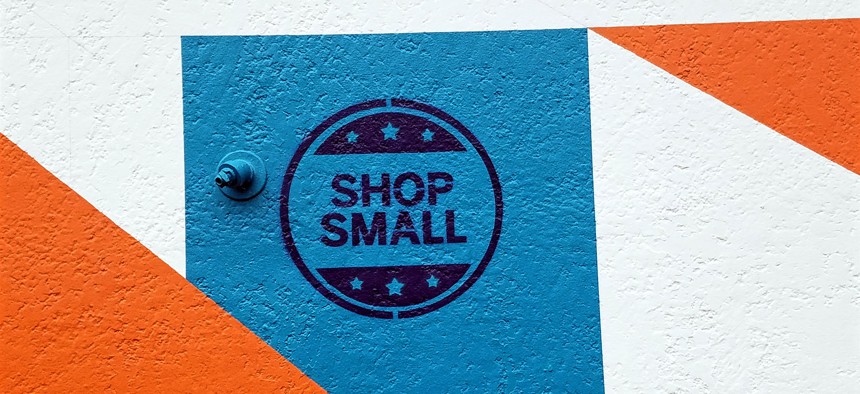The Mayoral Optics of ‘Small Business Saturday’

Michael Grass / RouteFifty.com

Connecting state and local government leaders
The annual event is usually a great way to connect with the community. But was D.C. Mayor Muriel Bowser’s choice of where to kick things off a good idea?
“Small Business Saturday” may not be an officially recognized holiday across the United States, but for city halls, the day after the traditional Black Friday shopping blitz has been an annual opportunity for elected officials and others working in or with municipal governments to be cheerleaders for small businesses in their communities.
These media-friendly opportunities are good chances to remind the public that small businesses form the backbones of so many local economies and are important generators of sales tax revenue.
Small Business Saturday started as a marketing campaign launched by American Express in 2010 to elevate the profiles of small businesses during the holiday shopping season.
It’s grown in years since, now counting support from an expanding array of federal, state and municipal leaders across the nation and includes numerous official city hall resolutions and community events, many organized by neighborhood business districts encouraging local residents to shop at small locally-owned stores, restaurants and other establishments.
What’s not to like? Making some sort of Small Business Saturday appearance is generally a no-brainer for any local public official, as long as they don't mind heading out and about on a weekend morning. Letting it be known that you support small businesses is something that pretty much everyone can get behind. It’s a great opportunity to connect with community members and neighborhood stakeholders plus get in front of news cameras in the process.
But the optics of a “Small Business Saturday” appearance shouldn’t be overlooked.
Usually, there are plenty of safe choices for venues. Salt Lake City Mayor Jackie Biskupski, for instance, went to Caputo’s Market and Deli and The King’s English Bookshop. Denver Mayor Michael Hancock stopped off at The Preservery, a “locally-owned market and restaurant that features Colorado-grown food and locally made products.”
And then there was Small Business Saturday in the nation’s capital.
At first glance, this tweeted photo from the D.C. Chamber of Commerce looks fairly innocuous.
There’s District of Columbia Mayor Muriel Bowser, joined by federal officials from the U.S. Small Business Administration, kicking off Small Business Saturday with an official ribbon-cutting for a new restaurant called The Shaw Bijou, one of many new local establishments in the historic and trendy Shaw neighborhood.
But even before it opened to the public earlier this month, The Shaw Bijou was the subject of plenty of scrutiny for the pursuits of its celebrity chef to open one of D.C.’s most expensive and exclusive restaurants, where the cost of dinner and drinks for two can approach four digits.
As Washington City Paper reported:
“Supporting small businesses is a key component of the mayor’s efforts to promote pathways to the middle class for all D.C. residents," according to a press release announcing the event. One of the mayor's chief initiatives is "building pathways to the middle class for a safer, stronger D.C."
But there's nothing middle class about The Shaw Bijou. It may be a young, independent small business, but the chairs there are covered in Icelandic sheepskin and blue velvet. Very few people can afford to sit in them.
The Shaw Bijou media opportunity was one stop on a tour of 17 new businesses in the Shaw neighborhood for Small Business Saturday, so organizers had plenty of options of where to start. But the place to kick things off ended up being an ostentatious high-end restaurant that plans to have a “private club whose members will be ‘selected’ by a committee” that has “almost a 1,000 person waitlist.”
And with that venue choice comes an air of exclusivity that runs afoul of the community-minded spirit that has driven much of the enthusiasm and support for Small Business Saturday. It’s certainly not a place where D.C. diners who only have middle-class paychecks can patronize.
Granted, The Shaw Bijou wasn’t the only stop for Bowser, who made the rounds across the nation’s capital on Saturday, including a bookstore and a women’s specialty boutique.
Those were safer venue choices that in hindsight would have been better options for the mayor as a Small Business Saturday starting point and would have likely avoided social media commentary like this: “Why would she do that at a restaurant already well vilified for its astronomical prices? Is she that ignorant or just plain out of touch?”
The lesson here? Mayoral optics matter, especially in a city with deepening levels of poverty that continues to struggle with income inequality.
Michael Grass is Executive Editor of Government Executive’s Route Fifty and is based in Seattle. He is the founding co-editor of DCist and a former deputy managing editor of Washington City Paper.

NEXT STORY: In Booming Dallas, Bankruptcy Talk Shines Light on City’s Tough Fiscal Predicament





